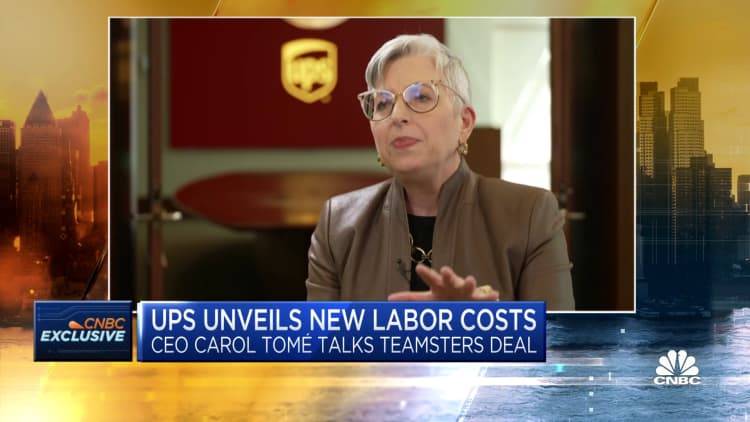American Airlines is loading cargo onto a 787 airplane at Philadelphia International Airport.
Leslie Josephs/CNBC
Multiple companies are voicing concerns that the rising cost of fuel and increasing employee wages will have a negative impact on their profits this quarter.
Companies ranging from aerospace manufacturers to package delivery giant UPS are dealing with new labor deals. At the same time, various unions from the auto industry to Hollywood are advocating for better compensation. Airlines, whose main expenses are jet fuel and labor, are facing especially significant challenges.
Delta Air Lines recently revised its adjusted earnings forecast for the third quarter to be between $1.85 and $2.05 per share, down from the previous estimate of $2.20 to $2.50. The airline stated that it is paying more for fuel than expected, and maintenance costs are also higher than anticipated.
According to Airlines for America, an industry group, U.S. jet fuel at major airports is now averaging $3.42 per gallon, which is a 38% increase from two months ago.
On Wednesday, American Airlines revised its earnings forecast as well, following similar revisions made by Alaska Airlines and Southwest Airlines. American Airlines now expects adjusted earnings per share to be between 20 cents and 30 cents for the third quarter, down from the previous estimate of up to 95 cents per share, citing more expensive fuel and a new pilot labor deal.
The company anticipates recognizing a $230 million expense for the new contract, which includes immediate 21% raises for pilots and overall compensation increasing by more than 46% over the four-year duration of the contract, with additional 401(k) contributions.
Meanwhile, labor unions in various industries, such as Detroit automakers and Hollywood, are pushing for higher wages, improved benefits, and better schedules in their new contracts. The Teamsters union, representing approximately 340,000 workers at UPS, reached a new labor deal in July that includes raises for both full-time and part-time employees and narrowly avoided a potential strike.
The UPS workers ratified the agreement last month. According to the company, by the end of the five-year contract, a driver could earn $170,000 in pay and benefits.
Earlier this week, UPS outlined the costs associated with the deal and stated that the expenses derived from it will increase at a compound annual growth rate of 3.3% over the next five years.
Brian Newman, the UPS finance chief, mentioned on an investor call this week that “Year one costs more than we originally forecast.” He stated that it will cost $500 million more in the second half of 2023 than initially expected.

As of midday Thursday, the United Auto Workers and Detroit automakers were still far apart in negotiations for new labor deals, which could result in strategic strikes at the companies after the 11:59 p.m. ET Thursday deadline, according to UAW President Shawn Fain on Wednesday night. The union is seeking hourly pay increases of more than 30%, a reduced 32-hour workweek, and other improvements.
Other unions are also demanding higher compensation. The strikes by Hollywood writers and actors began in May and mid-July, respectively, with members demanding better pay to reflect the changing dynamics of the entertainment-streaming era.
American Airlines has offered flight attendants an 11% pay increase on the start date of a new contract, followed by 2% raises after that. However, the Association of Professional Flight Attendants is requesting a 35% increase at the beginning of the new deal, followed by 6% annual raises.
Unions argue that workers have not received raises during periods of high inflation in recent years due to disruptions caused by the Covid pandemic.
The largest carriers have managed to cover their higher expenses thanks to strong travel demand. However, some airlines are experiencing a decline in sales just as a slower travel period begins. Spirit Airlines announced on Wednesday that it expects a larger loss than previously forecast and lower revenue.
Additionally, Frontier Airlines warned on Wednesday that “in recent weeks, sales have been trending below historical seasonality patterns” and projected an adjusted loss for the quarter.
– CNBC’s Michael Wayland and Gabriel Cortes contributed to this article.



)








